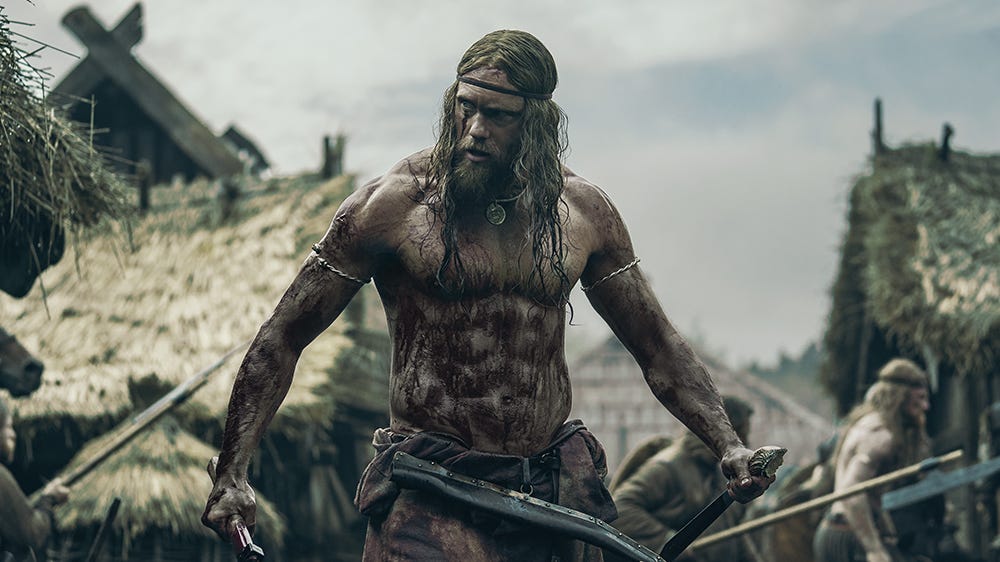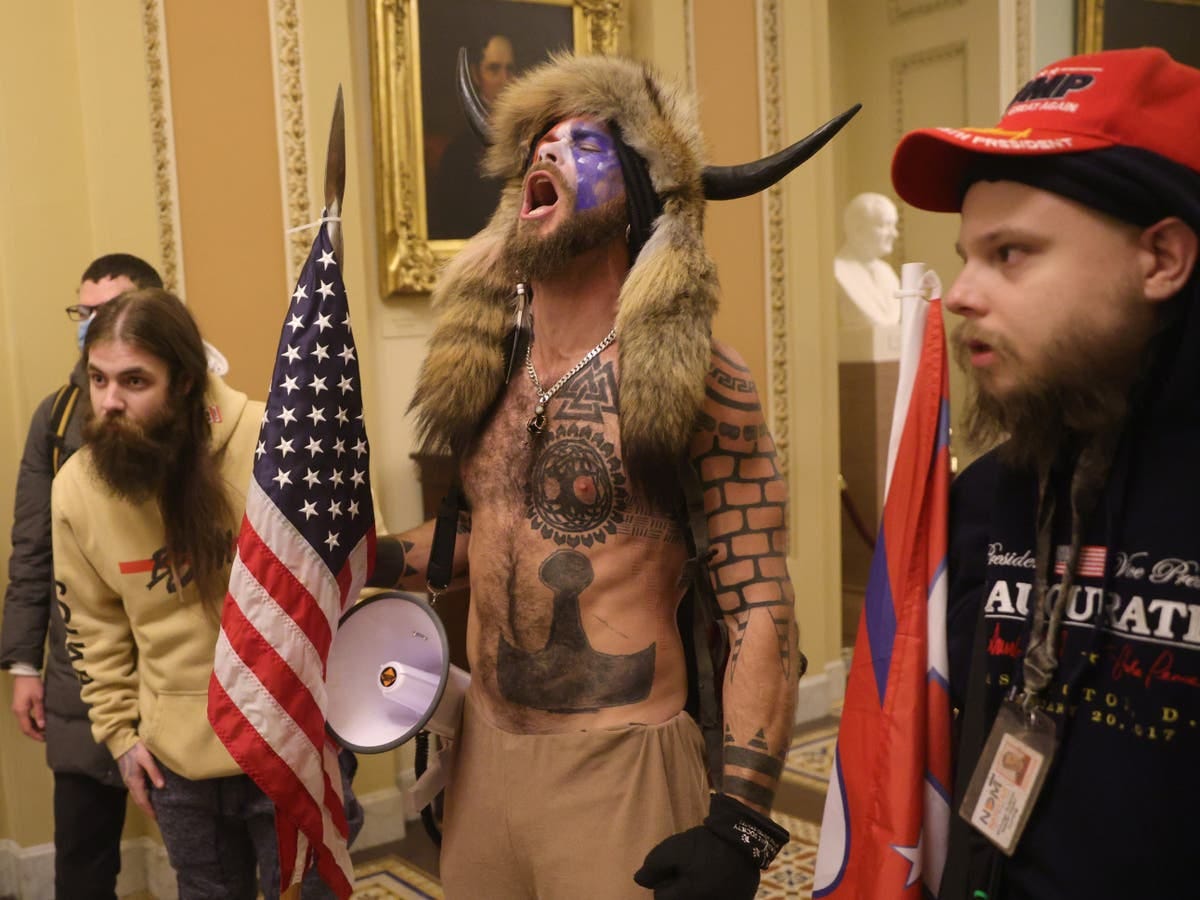The Northman
Stunning visually, gripping, action-packed, and accurate in its depiction of ninth and tenth-century Europe, The Northman is a hit. A reviewer at The Guardian is upset. What a shame!
Prince Amleth is just a boy when his father is murdered by his uncle and his mother is taken captive by the killer. Amleth dramatically escapes his uncle, his assailants, and the kingdom his father ruled over. As an adult (played by Alexander Skarsgård) he goes on to serve in Viking raids on Slavic villages before returning to the kingdom he was destined to inherit in pursuit of vengeance.
Criticisms that may be levelled at the production include its lack of deep character formation, an absence of great depth and complexity in the plot, no explanation as to why Amleth waits until what must be well into his thirties to seek revenge, and an unexplained supernatural causality and thrust to significant events in the story. However, the film’s special effects, engaging narrative, gripping fight scenes, and depiction of ninth and tenth-century Europe render The Northman well worth a watch.
Although the narrative lift off of The Northman is simple enough, a brutalised child seeks just retribution as a man, the portrayal of Amleth, to the credit of the creators, is not one of a predictable and oft-told morally virtuous hero. The main protagonist is revealed as a committed raider slaying defenders of villages with unflinching severity and is far from unsullied by the story’s end. This allows the watcher to more readily suspend their disbelief and lends more plausibly to a historical realism where individuals are so often both the victims and culprits of callous cultural realities.
Captivating battle scenes evince realism, and the mercilessness with which people are dispatched is brought to bear on the viewer without a gratuitous desire to brazenly beset us with a pointless orgy of blood and gore. The Northman is bloody, but in its account of Viking raiding at least, it is impactive rather than overindulgent. It conveys the horrors of war with gravitas. This is achieved not just in the rendering of manly fighting but also in its handling of rape in warfare. The crime is heavily insinuated in a way that spares overburdening the viewer. In this approach, The Northman finds balance, avoiding both a sanitised and excessive evocation.
The violent current that runs through the whole feature is tempered by a believable and not too distracting love story. The Northman offers us other relatable themes such as family tragedy, anguish, and sorrow, not to mention an unrequited expectation on the part of Amleth that will resonate with some. Such themes offer enough cause to invest in the narrative. Amid the tumult of combat and an arduous struggle for vengeance, there is the odd welcome moment of fun too.
So what might have upset a reviewer at The Guardian about The Northman? Writing in the paper, Steve Rose wails, ‘The Northman’s 10th-century society appears to be uniformly white and firmly divided along patriarchal lines. Men do the ruling and killing; women do the scheming and baby-making’.
It is clear then that Rose is upset because The Northman does not offer an ahistorical showcase of medieval Europe that anachronistically transposes actors into the film, unlike many other notable offerings of recent times.
Rose cites a post by someone who he labels far right without qualification on the website 4chan: ‘Northman is a based [agreeable] movie, all white cast and shows pure raw masculinity’. ‘Robert Eggers. He is restoring pride in our people with his great films. The Northman is going to be epic… Hail Odin.’ It might be fair to say that this post perhaps reveals a bit too much excitement, but far-right positions or beliefs? Whatever this might be defined as this week or next? The post reveals a sated longing to see a culture portrayed in an exciting, enjoyable, and empowering way. What might be wrong with a white person, watching a film set in an accurate European historical context and warming to it for this reason? Would anyone at The Guardian have a problem with a film containing an all-black cast set in an all-black society? No way, methinks. And would anyone begrudge black people for identifying positively with it on this basis? I would not.
Rose perceives the notion in The Northman, that Amleth and his partner bear traits supportive of a stable relationship and a cohesive white family unit to be abhorrent. One can imagine tears dripping onto his typewriter as he whinges, ‘Skarsgård’s love interest, played by Anya-Taylor Joy could be the far-right male’s dream woman: beautiful, fair-haired, loyal to her man and committed to bearing his offspring’. What a crime! It would seem here, especially given the obvious racial connotations of the ‘fair-haired’ reference, that Rose has a problem with the platforming of traditional white family structures.
The rest of Rose’s diatribe riffs off not even a tenuous link with the ‘far-right’ apart from a supposed penchant such people supposedly have for all things Viking. He crazily compares Amleth to the ‘Q-Anon Shaman’ who Rose terms ‘the abiding mascot of the 6 January assault on the US Capitol,’ as during those events he was, wait for it, ‘bare-chested, pumped up with battle rage, wearing a wolf’s pelt as headgear’. Oh the horror! This comparison simply does not stand up to observation.
In his broadside, Rose bizarrely references Anders Breivik and the Third Reich. It is incredulous that a film without even an ounce of racial antipathy to non-whites provoked such a tangential and miserable article.
The piece ludicrously speaks of a medieval ‘multicultural’ and ‘multiracial’ Europe. This is breathtakingly inaccurate. Europe has for most of its history been overwhelmingly white up until the post-World War II era. You will not be surprised to find that Rose’s hilarious claim was not reinforced with evidence, nor was his boast in support of the irrelevant assertion. ‘These people were travellers. They ranged far across Europe and the Arctic and they engaged and mixed with neighbouring cultures.’ And this denotes multiculturalism and multiracialism how?
There are more strange aspects to Rose’s article, but too many to list for the purpose of this piece.
It seems fair to say that an accurate portrayal of a film set in medieval Europe and thus in an overwhelmingly white context has triggered Rose. His heavy suggestion that films about a white past that appeal to white people should not be made, allied to his flagrant antipathy towards manifestations of a healthy white family structure reveal a substantial racial animus. Instances like this offer ample cause to turn up to the cinema and make The Northman a blockbuster that will be remembered for a very very long time. I might go and see it again. You should too.
I hope you enjoyed this review. This is the Heritage Site and the word heritage refers to what has been left to us from the past hence the importance of observing how history is presented today. My next piece will be the conclusion of the series on St George and dragons. I hope to write a book review or two after this. We will re-join the Franklins in either July or August.
I have corrected a few solecisms in my previous post. Feel free to point out errors that I have not detected. Apology that the initial email containing this post had some errors, I trust these have now been amended.
References
Norse code: are white supremacists reading too much into The Northman? | The Northman | The Guardian





